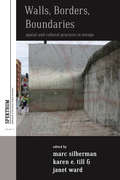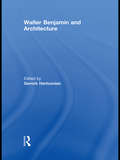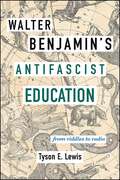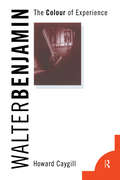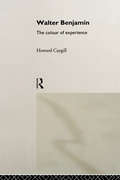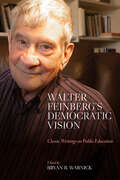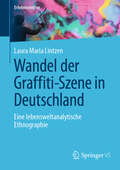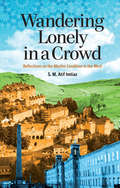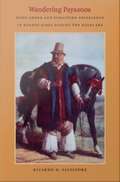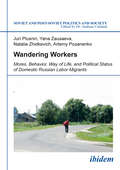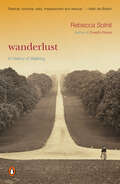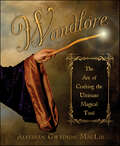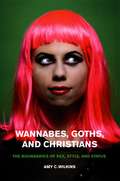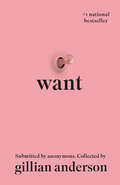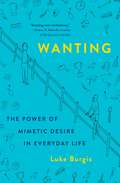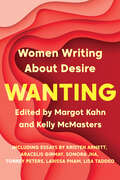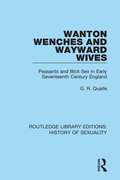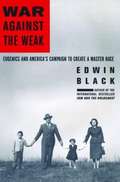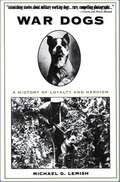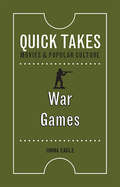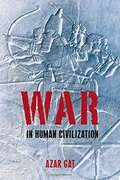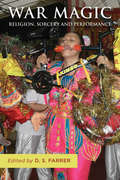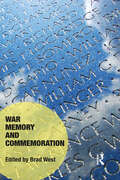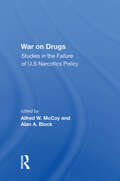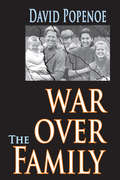- Table View
- List View
Walls, Borders, Boundaries
by Janet Ward Karen E. Till Marc SilbermanHow is it that walls, borders, boundaries--and their material and symbolic architectures of division and exclusion--engender their very opposite? This edited volume explores the crossings, permeations, and constructions of cultural and political borders between peoples and territories, examining how walls, borders, and boundaries signify both interdependence and contact within sites of conflict and separation. Topics addressed range from the geopolitics of Europe's historical and contemporary city walls to conceptual reflections on the intersection of human rights and separating walls, the memory politics generated in historically disputed border areas, theatrical explorations of border crossings, and the mapping of boundaries within migrant communities.
Walter Benjamin and Architecture
by Gevork HartoonianThe essays compiled in this book explore aspects of Walter Benjamin’s discourse that have contributed to the formation of contemporary architectural theories. Issues such as technology and history have been considered central to the very modernity of architecture, but Benjamin’s reflection on these subjects has elevated the discussion to a critical level. The contributors in this book consider Walter Benjamin's ideas in the context of digitalization of architecture where it is the very technique itself that determines the processes of design and the final form. This book was published as a special issue of Architectural Theory Review.
Walter Benjamin's Antifascist Education: From Riddles to Radio
by Tyson E. LewisWalter Benjamin's Antifascist Education is the first comprehensive analysis of educational themes across the entirety of the critical theorist's diverse writings. Starting with Benjamin's early reflections on teaching and learning, Tyson E. Lewis argues that the aesthetic and cultural forms to which Benjamin so often turned—namely, radio broadcasts, children's theatrical productions, collections, cityscapes, public cinemas, and word games—swell with educational potentialities. What emerges from Lewis's reading is a constellational curriculum composed of minor practices such as poor teaching, absentminded learning, and nondurational studying. This curriculum carries political significance, offering an antidote to past and present forms of fascist manipulation, hardness, and coldness. Walter Benjamin's Antifascist Education is a testimony to Benjamin's belief that "everyone is an educator and everyone needs to be educated and everything is education."
Walter Benjamin: The Colour of Experience
by Howard CaygillThis book analyzes the development of Walter Benjamin's concept of experience in his early writings showing that it emerges from an engagement with visual experience, and in particular the experience of colour. It represents Benjamin as primarily a thinker of the visual field.
Walter Benjamin: The Colour of Experience
by Howard CaygillThis book analyses the development of Benjamin's concept of experience in his early writings showing that it emerges from an engagement with visual experience, and in particular the experience of colour.
Walter Feinberg’s Democratic Vision: Classic Writings on Public Education (SUNY series, Horizons in the Philosophy of Education)
by Walter FeinbergCollects Walter Feinberg's classic writings on the meaning of democracy for public education.For over fifty years, Walter Feinberg has been a leader in interpreting democracy in and its meaning for public education. In this collection, Feinberg explores the question of how to study education, the necessary role of history and philosophy in this endeavor, and the need for educational theorists to engage with the lived realities of students, parents, and teachers through philosophical anthropology. He demonstrates a particular way of paying attention to public education that brings an interpretive sensitivity for others to the big philosophical questions of what public schooling should be in democratic societies. Feinberg explores many of the central questions that vex educational policy and practice: What should be the purpose of public schools? What should we think of school choice proposals? What are the relationships between religion and public schools? Should schools promote an American identity? How should we think about affirmative action? In this tour of educational ideas, democracy is the central concern, as it both presents questions that demand answers and becomes an approach to studying education with rigor and sensitivity.
Wandel der Graffiti-Szene in Deutschland: Eine lebensweltanalytische Ethnographie (Erlebniswelten)
by Laura Maria LintzenWie konnte sich die Graffiti-Szene in Deutschland von einem kleinen, vorwiegend rechtswidrig und improvisierend agierenden Netzwerk zu einer der ältesten und stabilsten Szenen des Landes entwickeln? Die Untersuchung beleuchtet diese Entwicklung und zeichnet den Werdegang der Szene ab den 1980er Jahren über drei Generationen hinweg nach. Thematisiert werden insbesondere Veränderungen von szenetypischen und teilhaberelevanten Handlungen, der Wandel der Szene auf strukturaler Ebene sowie sich transformierende Bedingungen für den Szene-Einstieg. Abseits gesellschaftlicher Dramatisierungen, Missverständnisse und Mythen werden relevante Aspekte der Lebenswelt Graffiti-Szene aus Binnenperspektive typologisiert, darunter szenetypische Graffiti-Ästhetiken, Writer-Typen und Spot-Formen. Die Arbeit zielt darauf ab, sowohl einen Beitrag zum vertieften Verständnis der Entwicklungsdynamik posttraditionaler Vergemeinschaftungen zu leisten als auch bestehende Vorurteile abzubauen.
Wandering Lonely in a Crowd
by S. M. Atif Imtiaz"S. M. Atif Imtiaz's desire for genuine discussion about Islam in Britain is striking and compelling" -The Telegraph "Imtiaz's wisdom is offered in a simple, direct, accessible prose [and] speaks to all concerned with the place of Muslims in the West. "--Tariq Modood, professor, University of Bristol "A compelling mix of intellectualism and vivid reportage. "--Madeleine Bunting, associate editor and columnist, Guardian "Imtiaz is telling us to wake up to some tough global realities. Islam matters, more than anything else. Not just because it offers the most compelling and widely-followed alternative to turbo-capitalism, but because it does so on the basis of monotheism, history's most powerful idea. In these essays, spanning British and global Islamic issues of burning moment, Imtiaz reminds us that God has not gone away. "--Abdal Hakim Murad, dean, Cambridge Muslim College Wandering Lonely in a Crowd: Reflections on the Muslim Condition in the West is a timely collection of essays, articles, lectures, and short stories that reflect on the years between 9/11 and Barack Obama. They cover the themes of integration, community cohesion, terrorism, radicalization, cultural difference, multiculturalism, identity politics, and liberalism. Beginning with a raw and unedited response to the terrorist attacks of 9/11 and ending with Obama's election, S. M. Atif Imtiaz covers the numerous facets of the debate that surrounds Western Muslims today. The book sets out a narrative for these years and a response that argues that Western Muslims should move away from identity politics towards Islamic humanism. S. M. Atif Imtiaz holds a doctorate in social psychology, is a longstanding community activist, and has worked in equalities for the Bradford and Airedale Primary Care Trust in England.
Wandering Paysanos: State Order and Subaltern Experience in Buenos Aires During the Rosas Era
by Ricardo D. SalvatoreA pioneering examination of the experiences of peasants and peons, or paysanos, in the Buenos Aires province during Juan Manuel de Rosas's regime (1829-1852), Wandering Paysanos is one of the first studies to consider Argentina's history from a subalternist perspective. The distinguished Argentine historian Ricardo D. Salvatore situates the paysanos as mobile job seekers within an expanding, competitive economy as he highlights the points of contention between the peasants and the state: questions of military service, patriotism, crime, and punishment. He argues that only through a reconstruction of the different subjectivities of paysanos--as workers, citizens, soldiers, and family members--can a new understanding of postindependence Argentina be achieved. Drawing extensively on judicial and military records, Salvatore reveals the state's files on individual prisoners and recruits to be surprisingly full of personal stories directly solicited from paysanos. While consistently attentive to the fragmented and mediated nature of these archival sources, he chronicles how peons and peasants spoke to power figures--judges, police officers, and military chiefs--about issues central to their lives and to the emerging nation. They described their families and their wanderings across the countryside in search of salaried work, memories and impressions of the civil wars, and involvement with the Federalist armies. Their lamentations about unpaid labor, disrespectful government officials, the meaning of poverty, and the dignity of work provide vital insights into the contested nature of the formation of the Argentine Confederation. Wandering Paysanos discloses a complex world until now obscured--that of rural Argentine subalterns confronting the state.
Wandering Workers: Mores, Behavior, Way of Life, and Political Status of Domestic Russian Labor Migrants (Soviet and Post-Soviet Politics and Society #141)
by Yana Zausaeva Artemy Pozanenko Natalia Zhidkevich Juri PlusninThis timely book offers a fresh perspective on the issue of contemporary migratory labor, otkhodnichestvo, in Russia—the temporary departure of inhabitants from small towns and villages for short-term jobs in the major cities of Russia. Although otkhodnichestvo is a mass phenomenon, it is not reflected in official economic statistics. Based on numerous interviews with otkhodniks and local experts, this stunningly original work focuses on the central and northern regions of European Russia. The authors draw a social portrait of the contemporary otkhodnik and offer a sociological assessment of the economic and political status these "wandering workers" live with.
Wanderlust: A History of Walking
by Rebecca SolnitDrawing together many histories-of anatomical evolution and city design, of treadmills and labyrinths, of walking clubs and sexual mores-Rebecca Solnit creates a fascinating portrait of the range of possibilities presented by walking. Arguing that the history of walking includes walking for pleasure as well as for political, aesthetic, and social meaning, Solnit focuses on the walkers whose everyday and extreme acts have shaped our culture, from philosophers to poets to mountaineers. She profiles some of the most significant walkers in history and fiction-from Wordsworth to Gary Snyder, from Jane Austen's Elizabeth Bennet to Andre Breton's Nadja-finding a profound relationship between walking and thinking and walking and culture. Solnit argues for the necessity of preserving the time and space in which to walk in our ever more car-dependent and accelerated world.
Wandlore: The Art of Crafting the Ultimate Magical Tool
by Alferian Gwydion MacLirLearn the secrets of wandmaking and gain a powerful new tool for magical workings of all sorts. This enchanting, one-of-a-kind guidebook is for anyone who's ever wanted to know how magic wands work or longed to have a real magic wand of his or her own. Written by the foremost authority on the making of wands, this book is the first devoted solely to the art of wandmaking and its mysteries.Discover how a tree branch is transformed into a wand of magic, from selecting the wood and working in harmony with the tree spirits (or dryads) to understanding the magical correspondences of different stones, colors, and metals. Wandlore reveals aspects of wand theory that have never been discussed before in print—such as how the four-part design of a magic wand relates to the four alchemical elements, and the role of astrology, elemental correspondences, and the spheres of existence in wandmaking. It shares the magical process for empowering wand cores using phoenix feathers, unicorn hair, and elements of other mythical creatures.This groundbreaking masterwork belongs in the library of every practicing magician, witch, wizard, or druid.
Wannabes, Goths, and Christians: The Boundaries of Sex, Style, and Status
by Amy C. WilkinsSubcultures help young people, especially women, navigate connecting territories by offering them different sexual strategies: wannabes cross racial lines, goths break taboos by becoming involved with multiple partners, and Christians forego romance to develop their bond with God.
Want: Sexual Fantasies by Anonymous
by Gillian AndersonA collection of women's sexual fantasies from women around the world, Want is a revelatory, sensational and game-changing exploration of women's sexuality that asks, and answers: How do women feel about sex when they have the freedom to be totally anonymous?What do you want when no one is watching? Who do you fantasize about when the lights are off?When you think about sex, what do you really want?When we talk about sex, we talk about womanhood and motherhood, infidelity and exploitation, consent and respect, fairness and egalitarianism, love and hate, pleasure and pain. And yet so many of us don't talk about it at all.In this groundbreaking book, Gillian Anderson collects and introduces the anonymous sexual fantasies of hundreds of women from around the world (along with her own anonymous fantasy). The fantasies are extraordinary: they are full of desire, fear, intimacy, shame, satisfaction and, ultimately, liberation. From fantasising about someone off-limits to conjuring a scene with multiple partners, from sex that is gentle and tender to passionate and playful, from women who have never had sex to women who have had more sex than they can remember, these letters provide a window into the most secret part of our minds.Want reveals how women feel about sex when they have the freedom to be totally themselves.
Wanting: The Power of Mimetic Desire in Everyday Life
by Luke BurgisA groundbreaking exploration of why we want what we want, and a toolkit for freeing ourselves from chasing unfulfilling desires.Gravity affects every aspect of our physical being, but there’s a psychological force just as powerful—yet almost nobody has heard of it. It’s responsible for bringing groups of people together and pulling them apart, making certain goals attractive to some and not to others, and fueling cycles of anxiety and conflict. In Wanting, Luke Burgis draws on the work of French polymath René Girard to bring this hidden force to light and reveals how it shapes our lives and societies. According to Girard, humans don’t desire anything independently. Human desire is mimetic—we imitate what other people want. This affects the way we choose partners, friends, careers, clothes, and vacation destinations. Mimetic desire is responsible for the formation of our very identities. It explains the enduring relevancy of Shakespeare’s plays, why Peter Thiel decided to be the first investor in Facebook, and why our world is growing more divided as it becomes more connected.Wanting also shows that conflict does not arise because of our differences—it comes from our sameness. Because we learn to want what other people want, we often end up competing for the same things. Ignoring our large similarities, we cling to our perceived differences.Drawing on his experience as an entrepreneur, teacher, and student of classical philosophy and theology, Burgis shares tactics that help turn blind wanting into intentional wanting--not by trying to rid ourselves of desire, but by desiring differently. It’s possible to be more in control of the things we want, to achieve more independence from trends and bubbles, and to find more meaning in our work and lives.The future will be shaped by our desires. Wanting shows us how to desire a better one.
Wanting: Women Writing About Desire
by Margot Kahn and Kelly McMastersAn intimate and empowering anthology of essays that explore the changing face of female desire in whip-smart, sensuous prose, with pieces by Tara Conklin, Camille Dungy, Melissa Febos, Lisa Taddeo, and othersWhat is desire? And what are its rules? In this daring collection, award-winning and emerging female writers share their innermost longings, in turn dismantling both personal and political constructs of what desire is or can be.In the opening essay, Larissa Pham unearths the ache beneath all her wants: time. Rena Priest&’s desire for a pair of five-hundred-dollar cowboy boots spurs a reckoning with her childhood on the rez and the fraught history of her hometown. Other pieces in the collection turn cultural tropes around dating, sex, and romance on their heads—Angela Cardinale tries dating as a divorced mother of two in the California suburbs only to discover sweet solace in being alone; Keyanah B. Nurse finds power in polyamory; and when Joanna Rakoff spots a former lover at a bar, the heat between them unravels her family as she is pulled into his orbit—an undoing, she decides, that&’s worth everything.Including pieces by Tara Conklin, Torrey Peters, Camille Dungy, Melissa Febos, Lisa Taddeo, and so many others, these candid and insightful essays tackle the complicated knot of women&’s desire.Featuring essays by Elisa Albert, Kristen Arnett, Molly McCully Brown, Angela Cardinale, Tara Conklin, Sonia Maria David, Jennifer De Leon, Camille T. Dungy, Melissa Febos, Amber Flame, Amy Gall, Aracelis Girmay, Sonora Jha, Nicole Hardy, Laura Joyce-Hubbard, TaraShea Nesbit, Keyanah B. Nurse, Torrey Peters, Amanda Petrusich, Larissa Pham, Rena Priest, Joanna Rakoff, Karen Russell, Domenica Ruta, Susan Shapiro, Terese Svoboda, Lisa Taddeo, Ann Tashi Slater, Abigail Thomas, Merritt Tierce, Michelle Wildgen, Jane Wong, and Teresa Wong
Wanton Wenches and Wayward Wives: Peasants and Illicit Sex in Early Seventeenth Century England (Routledge Library Editions: History of Sexuality #5)
by G. R. QuaifeOriginally published in 1979. This highly detailed study of illicit sex amongst the peasantry of Somerset between 1601 and 1660 recreates the atmosphere of the period and questions a number of previously accepted hypotheses. Based on the depositions presented to the county and regional courts during this period, it sheds as much light on prevailing village attitudes as it does on the specific discussion matter. Outlining the precarious existence of the peasant and the supervision of sexual morality, the book looks at pre-marital sex, pregnancy, prostitution, masturbation, contraception, rape, homosexuality and incest, along with the prevailing punishments of the time.This extensively researched work combines both demographic and literary-based analyses, with analytical and anecdotal approaches to the subject. It presents a rich source of social history, examining and questioning the role of Christian morality as an important factor in influencing the sexual habits of the peasant.
War Against The Weak: Eugenics And America's Campaign To Create A Master Race
by Edwin BlackIn War Against the Weak, award-winning investigative journalist Edwin Black connects the crimes of the Nazis to a pseudoscientific American movement of the early 20th century called eugenics. Based on selective breeding of human beings, eugenics began in laboratories on Long Island but ended in the concentration camps of Nazi Germany. Cruel and racist laws were enacted in 27 U.S. states, and the supporters of eugenics included progressive thinkers like Woodrow Wilson, Margaret Sanger, and Oliver Wendell Holmes. Ultimately, over 60,000 "unfit" Americans were coercively sterilized, a third of them after Nuremberg declared such practices crimes against humanity. This is a timely and shocking chronicle of bad science at its worst — with many important lessons for the impending genetic age.
War Dogs: Canines in Combat
by Michael G. LemishHistory of the United States military working dog. Contains brief discussion of early uses of war dogs with emphasis on canines used in World Wars I and II, in Korea and Vietnam.
War Games (Quick Takes: Movies and Popular Culture)
by Jonna EagleThe word “wargames” might seem like a contradiction in terms. After all, the declaration “This is war” is meant to signal that things have turned deadly serious, that there is no more playing around. Yet the practices of war are intimately entangled with practices of gaming, from military videogames to live battle reenactments. How do these forms of play impact how both soldiers and civilians perceive acts of war? This Quick Take considers how various war games and simulations shape the ways we imagine war. Paradoxically, these games grant us a sense of mastery and control as we strategize and scrutinize the enemy, yet also allow us the thrilling sense of being immersed in the carnage and chaos of battle. But as simulations of war become more integrated into both popular culture and military practice, how do they shape our apprehension of the traumatic realities of warfare? Covering everything from chess to football, from Saving Private Ryan to American Sniper, and from Call of Duty to drone interfaces, War Games is an essential guide for anyone seeking to understand the militarization of American culture, offering a compact yet comprehensive look at how we play with images of war.
War In Human Civilization
by Azar GatWhy do people go to war? Is it rooted in human nature or is it a late cultural invention? How does war relate to the other fundamental developments in the history of human civilization? And what of war today--is it a declining phenomenon or simply changing its shape? In this sweeping study of war and civilization, Azar Gat sets out to find definitive answers to these questions in an attempt to unravel the riddle of war throughout human history, from the early hunter-gatherers right through to the unconventional terrorism of the twenty-first century. In the process, the book generates an astonishing wealth of original and fascinating insights on all major aspects of humankind's remarkable journey through the ages, engaging a wide range of disciplines, from anthropology and evolutionary psychology to sociology and political science. Written with remarkable verve and clarity and wholly free from jargon, it will be of interest to anyone who has ever pondered the puzzle of war.
War Magic: Religion, Sorcery, and Performance
by Douglas FarrerThis compelling volume explores how war magic and warrior religion unleash the power of the gods, demons, ghosts, and the dead. Documenting war magic and warrior religion as they are performed in diverse cultures and across historical time periods, this volume foregrounds embodiment, practice, and performance in anthropological approaches to magic, sorcery, shamanism, and religion. The authors go beyond what magic ‘represents’ to consider what magic does. From Chinese exorcists, Javanese spirit siblings, and black magic in Sumatra to Tamil Tiger suicide bombers, Chamorro spiritual re-enchantment, tantric Buddhist war magic, and Yanomami dark shamans, religion and magic are re-evaluated not just from the practitioner’s perspective but through the victim’s lived experience. These original investigations reveal a nuanced approach to understanding social action, innovation, and the revitalization of tradition in colonial and post-colonial societies undergoing rapid social transformation.
War Memory and Commemoration (Memory Studies: Global Constellations)
by Brad WestIn a period characterised by an unprecedented cultural engagement with the past, individuals, groups and nations are debating and experimenting with commemoration in order to find culturally relevant ways of remembering warfare, genocide and terrorism. This book examines such remembrances and the political consequences of these rites. In particular, the volume focuses on the ways in which recent social and technological forces, including digital archiving, transnational flows of historical knowledge, shifts in academic practice, changes in commemorative forms and consumerist engagements with history affect the shaping of new collective memories and our understanding of the social world. Presenting studies of commemorative practices from Africa, Asia, Australia, Europe and the Middle East, War Memory and Commemoration illustrates the power of new commemorative forms to shape the world, and highlights the ways in which social actors use them in promoting a range of understandings of the past. The volume will appeal to scholars of sociology, history, cultural studies and journalism with an interest in commemoration, heritage and/or collective memory.
War On Drugs: Studies In The Failure Of U.s. Narcotics Policy
by Alfred W. MccoySince George Bush declared his war on drugs in 1989, cocaine addiction in America has increased 15%, and narcotics have emerged as major commodities from the Third World. Focusing on US narcotics policy, Latin America's cocaine traffic and Asia's heroin trade, the essays in this book offer evidence indicating that the war is not working.
War Over the Family
by David PopenoeOne of the most surprising and controversial social debates of the past two decades has been about the meaning and importance of marriage and the family in contemporary American life. Referred to by some as a culture "war over the family," the debate has pitted those concerned about the weakening of the traditional married-parent nuclear family, especially in its impact on children, against those arguing that nothing has gone wrong with families--that they are merely "diversifying." David Popenoe has been one of the most influential figures in laying out for a wide audience the importance of "family decline," and what it means for our children, our society, and our future.
